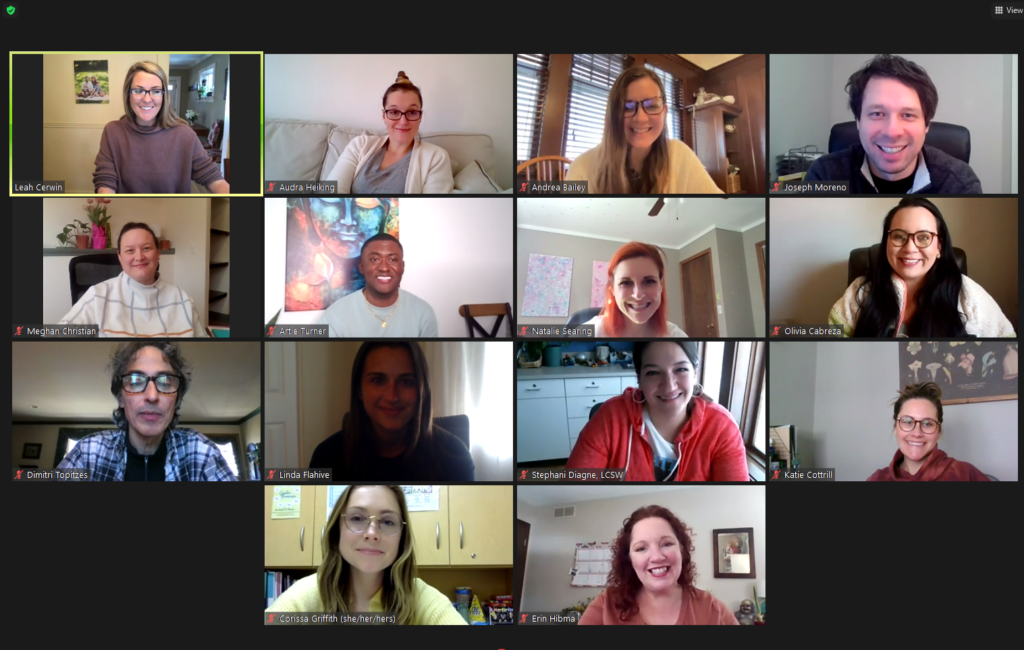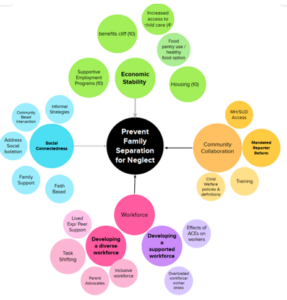The mission of the Institute for Child and Family Well-Being is to improve the lives of children and families with complex challenges by implementing effective programs, conducting cutting-edge research, engaging communities, and promoting systems change.
The Institute for Child and Family Well-Being is a collaboration between Children’s Wisconsin and the Helen Bader School of Social Welfare at the University of Wisconsin-Milwaukee. The shared values and strengths of this academic-community partnership are reflected in the Institute’s three core service areas: Program Design and Implementation, Research and Evaluation, and Community Engagement and Systems Change.
In This Issue:
- Program Design and Implementation
- Research and Evaluation
- Community Engagement & Systems Change
- Recent and Upcoming Events
Program Design and Implementation
The Institute develops, implements and disseminates validated prevention and intervention strategies that are accessible in real-world settings.
PCIT Training
By Leah Cerwin
Another fantastic virtual training is underway with our 2023 PCIT (Parent Child Interaction Therapy) Cohort. Our PCIT Trainers, Leah Cerwin, Meghan Christian, and Dimitri Topitzes have had the pleasure of training and coaching 10 Children’s Wisconsin therapists from Child and Family Counseling clinics in Madison, Milwaukee, Racine, and Walworth and two Integrated Behavioral Health clinics and 2 Master of Social Work students that are currently placed with our team at the ICFW. These clinicians are receiving an introductory clinically-based training for licensed mental health providers (or those pursuing licensure) in Wisconsin who are interested in becoming PCIT therapists. This training is meant for practicing professionals and includes foundational skills in the PCIT protocol, Dyadic Parent-Child Interaction Coding System (DPICS), and the CDI and PDI phases of treatment. Experiential learning opportunities in coding and coaching techniques will be provided, with a particular emphasis on developing PCIT competencies, coding reliability, and fidelity to the PCIT model.
This engaged group of clinicians will continue to expand meaningful access to this effective therapy for children and caregivers across our state. To learn more about PCIT and future training opportunities, check out our website.

Building Brains with Relationships Workshops

If an organization, company or person can be self-reflective and focused on growth, all things are a work in progress. The most recent Building Brains with Relationships workshop was the most successful yet thanks to the participants’ interaction, mindful after-action reviews and participant feedback of past workshop dates. Because this workshop is well-received, ICFW is looking to develop promising partnerships with those who may wish to bring this learning experience to their community. If you’re interested in helping to scale this workshop you can contact mchristian@childrenswi.org. Those who are interested in attending can find more details below.
If you’d like to attend a workshop and/or join the Protective Factors Community of Practice at an upcoming date on June 14th or November 15th, create an account here and after that, email wcwpds-mke@uwm.edu with your desired ticket date to reserve your seat. All dates will be hosted at the Wisconsin Child Welfare Professional Development-UWM extension site at 4425 N. Port Washington Road, Suite 400, Glendale, WI 53212.
Learn More:
Building Brains with Relationships
Research and Evaluation
The Institute accelerates the process of translating knowledge into direct practices, programs and policies that promote health and well-being, and provides analytic, data management and grant-writing support.
Recent ICFW Publications
Topitzes, J., Bacalso, E., Plummer-Lee, C. T., Jonas-Gordon, S., & Mersky, J. P. (2022).
The current study tested a trauma screening, brief intervention, and referral to treatment (T-SBIRT) interview protocol as implemented within Temporary Assistance to Needy Families programming.
Adverse adult experiences and health outcomes: Racial and ethnic differences in a low-income sample
Mersky, J. P., Plummer Lee, C., & Janczewski, C. E. (2022).
Extending research on adverse childhood experiences (ACEs), this study aimed to investigate whether the prevalence of and outcomes associated with adverse adult experiences vary among racial and ethnic subgroups.
The Association between Family Physical Environment and Child Maltreatment
Zhang, L., & Topitzes, J. (2022).
A body of emerging research has indicated that adverse family physical environment is related to parenting problems such as parent-child conflict, decreased caregiver sensitivity, and less parental emotional availability. Yet, no study has examined if family physical environment is also associated with child abuse and neglect. This study aimed to examine the relationships between family physical environment and different types of child maltreatment.
Community Engagement & Systems Change
The Institute develops community-university partnerships to promote systems change that increases the accessibility of evidence-based and evidence-informed practices.
Strong Families, Thriving Children, Connected Communities Initiative – Emerging Critical Pathways
By Luke Waldo
Children thrive when they have regular interactions with responsive, caring adults. Families experiencing significant stressors related to financial insecurity, housing instability, or the impact of systemic racism and interpersonal trauma can be overloaded with stress, interrupting those interactions. In the United States 1 in 3 of all children will experience a Child Protective Services (CPS) investigation, 1 in 10 will have confirmed or substantiated instances of maltreatment, and in Wisconsin 70% of all children in foster care were separated from their families with neglect cited as a removal reason.
We believe that neglect is preventable. The goal of the Strong Families, Thriving Children, Connected Communities (SFTCCC) initiative is to reduce the number of family separations for reasons of neglect by building a community focused on collaboratively pursuing policies and practices that support overloaded families and address systemic failings. SFTCCC launched in early 2022 and is focused on building a shared understanding of the root causes of neglect to better identify critical pathways towards prevention.
Critical Pathways are specific problem/priority spaces that are focal points for elevating or designing specific and actionable system-level solutions. Through a series of seven roundtables, four Conversation Cafes, and a Data Walk during the past year, we’ve worked with staff at Children’s Wisconsin, community organizations, and people with lived experience to identify systemic challenges, risk factors, and barriers to supporting families overloaded by stress. We have analyzed the data that we have collected through these community events along with the emerging research in the field to develop our emerging Critical Pathways.

Over the last couple months, we have gathered feedback from our community and organizational partners on our four emerging draft Critical Pathways –
- Economic Stability,
- Social Connectedness,
- Inclusive and Supportive Workforce,
- Community Collaboration
– to finalize their framing and initial strategies prior to our public launch in late July.
Even if you haven’t been to any SFTCCC events before, now is a great time to get involved as we begin the collaborative journey on our Critical Pathways to identify and design system-level solutions that will support overloaded families and keep them together. By joining the Critical Pathways journey, you will:
- Build relationships with key stakeholders – organizational and community leaders and staff, people with lived experience – from around the state to better understand these complex issues, surface priorities, and guide solution design;
- Gain broader access to tools, workshops, webinars, and events;
- Discover and share ideas with the many local initiatives across the state;
- Identify levers and advocate for policy and systems change.
If you are interested in learning more and/or joining this initiative, please visit the SFTCCC project page or sign up here.
Executive Summary: Trauma and Recovery Project
By Leah Cerwin
Our Trauma and Recovery Project (TARP) came to an end late last year. Upon completing the project, we conducted a series of After Action Reviews with our TARP team. Additionally, we conducted focus groups with leaders and therapists that had been trained in Parent Child Interaction Therapy (PCIT), Trauma-Focused Cognitive Behavioral Therapy (TF-CBT), and/or Child Parent Psychotherapy (CPP) and then delivered those therapies to children and families under the TARP grant. Our findings from these AARs and focus groups combined with our evaluation data contributed to our newly released Trauma and Recovery Project: 2017-2022 Executive Summary report.
TARP was a 5-year Substance Abuse and Mental Health Services Administration funded initiative that aimed to increase the availability and accessibility of trauma responsive treatments for children and families in southeastern Wisconsin.
In the Executive Summary, you will discover how TARP accomplished its goals by screening and assessing children for trauma, increasing the pool of clinicians trained in evidence-based practices, and increasing the number of children and caregivers that receive appropriate and trauma-responsive services. Over the years of the grant, our TARP team encountered barriers and successes along the way. This report sought to discuss these elements, and highlight the experiences of the therapists who participated in the grant, and discuss future proposals for similar projects.
Recent and Upcoming Events
The Institute provides training, consultation and technical assistance to help human service agencies implement and replicate best practices. If you are interested in training or technical assistance, please complete our speaker request form.
- February and March 2023 – Parent Child Interaction Therapy Therapist Training
- April 6th – T-SBIRT Training with Wisconsin Department of Children and Families Transitional Jobs and Transform Milwaukee Jobs Programming in Madison, WI.
- April 12th – Together for Children Conference
- April 20th – T-SBIRT Training at Saint Hyacinth Food Cooperative.
- April 20th and June 14th – Building Brains with Relationships workshop
- May 9th – WAFCA Information Session on SFTCCC
- May 22nd – Virtual statewide meeting. T-SBIRT Training Booster Session. Wisconsin Family Foundations Home Visiting Programs.
- June 13th-16th – Society for Epidemiological Research Annual Meeting, Portland, OR.
- Marcus, L.M, Topitzes, J., Pathak, D.R., Cho, Y., Hirko, K., Houang, R., Kwarteng, J. Hamilton, A.S., & Velie, E.M. (2023). Impact of racial and childhood socioeconomic position on latent class analysis-defined concurrent adverse childhood experiences in a population-based sample.

